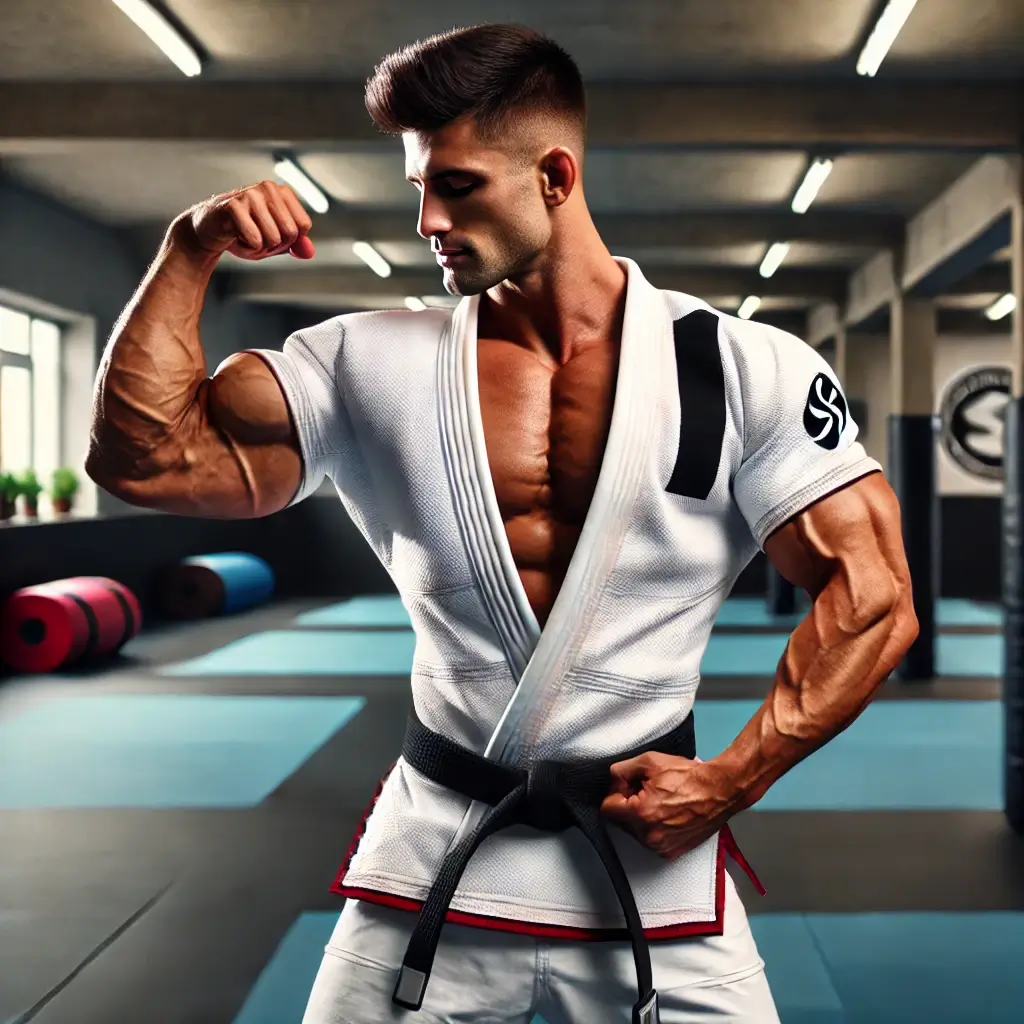Brazilian Jiu Jitsu (BJJ) is often praised for its self-defense techniques, mental resilience, and strategic depth. However, another significant benefit that is sometimes overlooked is its potential for muscle building. Whether you are training at The Way Martial Arts in Lake Worth, Boynton Beach, or another academy in Florida, understanding how BJJ contributes to muscle development can enhance your training approach and overall fitness.
Understanding Muscle Growth: The Science Behind It
To comprehend how Jiu Jitsu can build muscle, it’s essential to first understand the basics of muscle growth, or hypertrophy. Muscles grow when they are subjected to stress that causes micro-tears in the muscle fibers. These tears then heal, growing stronger and thicker, which results in increased muscle mass. The primary factors contributing to muscle growth include resistance training, proper nutrition, and adequate rest.

How Jiu Jitsu Promotes Muscle Growth
1. Resistance Training in BJJ
Resistance training is a key component of muscle growth. In BJJ, resistance is created naturally through grappling with an opponent. Whether you’re executing a guard pass, performing a sweep, or holding down an opponent in side control, your muscles are constantly working against resistance. This constant engagement of your muscles—especially in the core, legs, back, and arms—mimics the effects of traditional weightlifting, leading to muscle hypertrophy over time.
For example, when you perform a guard pass, your legs and core engage intensely to maintain balance and control. Over time, this repeated effort builds strength and muscle in these areas. Similarly, holding an opponent in side control or mount requires significant upper body and core strength, contributing to muscle development.
2. Functional Strength vs. Isolated Strength
Traditional weightlifting often focuses on isolated movements—think bicep curls or leg presses. While these exercises are effective for targeting specific muscle groups, they do not always translate well into functional strength, which is the ability to perform real-world physical tasks. Jiu Jitsu, on the other hand, is a full-body workout that requires the coordinated use of multiple muscle groups.
In BJJ, you are constantly shifting your body weight, adjusting your posture, and using leverage—all of which require functional strength. Over time, this type of training not only builds muscle but also improves your overall athleticism, making you stronger, more agile, and better equipped for daily physical tasks.
3. Cardiovascular Training and Muscle Definition
Jiu Jitsu is not just about strength; it also involves a significant amount of cardiovascular training. The high-intensity nature of rolling (sparring) in BJJ sessions increases your heart rate and burns calories, which helps reduce body fat and enhances muscle definition. This combination of strength training and cardio makes BJJ an effective way to build lean, well-defined muscles.
A study published in the Journal of Strength and Conditioning Research found that combat sports, including BJJ, significantly improve both anaerobic and aerobic capacity. This improvement in cardiovascular health contributes to overall fitness and enhances muscle definition by reducing excess fat.
4. Core Stability and Strength
The core is one of the most critical muscle groups in Brazilian Jiu Jitsu. Every technique in BJJ, from bridging out of a bad position to executing a submission, relies heavily on core strength. A strong core is not just about aesthetics; it’s essential for maintaining balance, generating power, and preventing injuries.
A strong core also contributes to better posture and stability, both on and off the mat. As you continue training, you’ll notice increased muscle tone and strength in your abdominal and lower back muscles, which are constantly engaged during BJJ sessions.
Real-World Examples and Testimonials
Many practitioners have shared their experiences of building muscle through BJJ. For example, professional fighters like Herbert Burns, who trains at The Way Martial Arts in Lantana, often highlight the muscle-building benefits of their training routines. Herbert’s training regimen includes intensive BJJ sessions that help maintain his muscle mass and functional strength, crucial for competing at the highest levels.
Another example is a study conducted by the National Strength and Conditioning Association, which found that participants who engaged in martial arts like BJJ experienced significant increases in muscle strength and endurance after just a few months of training.
Case Study: BJJ vs. Traditional Strength Training
A comparative case study involving two groups—one practicing BJJ and the other following a traditional strength training program—showed that while both groups experienced muscle growth, the BJJ practitioners also showed improvements in flexibility, endurance, and functional strength, areas where the strength training group did not see as much progress. This highlights the comprehensive benefits of BJJ as a muscle-building exercise.
Nutrition’s Role in Muscle Building for BJJ Practitioners
While Jiu Jitsu provides the stimulus for muscle growth, proper nutrition is essential to see significant results. Consuming enough protein is crucial, as it provides the building blocks needed for muscle repair and growth. Carbohydrates are also important, as they fuel your workouts and help with recovery.
BJJ practitioners should aim to consume a balanced diet that includes lean proteins (such as chicken, fish, or plant-based options), complex carbohydrates (like whole grains, fruits, and vegetables), and healthy fats (such as avocados, nuts, and seeds). Proper hydration is also critical, especially considering the intense physical exertion involved in BJJ training.
Recovery: The Unsung Hero of Muscle Growth
Recovery is often overlooked in discussions about muscle growth, but it’s just as important as the training itself. Muscles need time to repair and grow after being stressed during training. Incorporating adequate rest days into your training regimen, getting enough sleep, and practicing recovery techniques like stretching and foam rolling can all enhance muscle growth.
In Jiu Jitsu, the concept of recovery also extends to managing injuries. Due to the physical nature of the sport, injuries can occur, and how you manage them can impact your muscle growth and overall progress. It’s crucial to listen to your body and give it the time it needs to heal, ensuring that you can continue training effectively in the long run.
The Role of Consistency in Muscle Development
Consistency is key in any fitness regimen, and Jiu Jitsu is no exception. Attending regular classes at The Way Martial Arts in Lake Worth, Boynton Beach, or Lantana ensures that your muscles are continually challenged, leading to steady growth over time. Consistent training also helps reinforce the techniques and strategies you learn, making you a more proficient martial artist.
Mental Benefits: The Mind-Muscle Connection
An often overlooked aspect of muscle building is the mind-muscle connection. This concept refers to the ability to focus on and control the muscles you’re working during an exercise. In BJJ, this connection is naturally strengthened as you become more aware of your body and its movements. This heightened awareness can lead to more effective training sessions, as you’re able to engage the correct muscles more efficiently.
BJJ as a Lifetime Fitness Activity
Unlike some sports or fitness activities that might become difficult to maintain as you age, Jiu Jitsu is often practiced well into older age. The sport is adaptable, allowing practitioners to adjust their intensity levels based on their fitness and life stage. This makes BJJ not just a means to build muscle in the short term, but a lifelong practice that can contribute to long-term health and fitness.
Real-Life Testimonial
Consider the experience of John, a 45-year-old BJJ practitioner from Boynton Beach. After years of weightlifting, John decided to try BJJ for its strategic depth. Six months into his training, he noticed significant muscle gains, particularly in his core and legs. He also found that his overall endurance improved, and he felt more agile than ever before. John’s story is a testament to the muscle-building power of Jiu Jitsu, even for those who come from a traditional strength training background.
Conclusion: Will Jiu Jitsu Build Muscle?
The answer is a resounding yes. Brazilian Jiu Jitsu not only builds muscle but does so in a way that enhances functional strength, improves endurance, and promotes overall fitness. Whether you’re in Lake Worth, Boynton Beach, or Lantana, BJJ offers a full-body workout that challenges every muscle group, helping you achieve your fitness goals in a supportive and engaging environment.
If you’re looking to build muscle while learning valuable self-defense skills, joining a Jiu Jitsu class in Florida might be the perfect solution. The Way Martial Arts offers comprehensive BJJ programs tailored to all levels, ensuring that you get the most out of your training. Ready to start building muscle with Jiu Jitsu? Join a class today and take the first step toward a stronger, more powerful you.
Ready to see the results for yourself? Contact The Way Martial Arts today to book your first class and start your journey toward building muscle with Brazilian Jiu Jitsu.

Leave a Reply